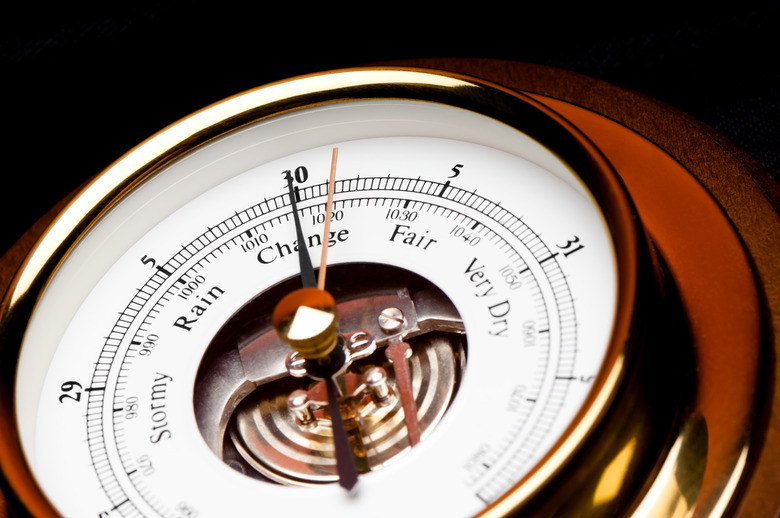The Definitions Of Temperature, Dew Point And Barometric Pressure
Many different factors impact the weather patterns on Earth. Measurements like temperature, dew point and barometric pressure can not only impact the weather but also how it feels when you walk outside. These factors interact with one another to alter the weather.
What Is Temperature?
What Is Temperature?
Temperature is the measure of how hot or cold something is. When discussing temperature in a weather forecasting situation, it refers to how hot or cold the atmosphere is at the Earth's surface. The temperature of any given point on our planet varies based on how far that place is from the sun, this will vary based on the geographic location as well as the season.
People measure temperature using three primary scales. Those in the United States and a few other countries utilize the Fahrenheit scale. Those in countries that utilize the metric system measure temperature in Celsius. Finally, some scientists also measure the temperature in Kelvin.
What Is Dew Point?
What Is Dew Point?
Dew point is the temperature that air needs to reach in order to achieve 100% relative humidity. At 100% relative humidity, water vapor condenses into a liquid form (either precipitation or fog). Generally, the higher the dew point, the more humid it feels outside. During the summer, you can judge how humid it feels outside based on the following dew point values:
- Dew point less than 55 degrees Fahrenheit – Does not feel humid, but rather comfortably dry
- Dew point between 55 degrees Fahrenheit and 65 degrees Fahrenheit – Begins to feel humid and muggy
- Dew point greater than 65 degrees Fahrenheit – High humidity, oppressively humid
How Does Temperature Affect Dew Point?
How Does Temperature Affect Dew Point?
The ambient air temperature doesn't directly impact the dew point, but it does impact how humid it feels outside. The relative humidity doesn't provide an accurate indication of how humid it is outside, but the outside temperature and the dew point does.
For example, a colder day with a relative humidity of 100% would not feel as humid as a hotter day with a relative humidity of 60%. The higher the dew point is, the less comfortable you feel outside. If the temperature outside is 40 degrees Fahrenheit, and the dew point is 40 as well, even though the relative humidity is 100% the air does not feel humid. Conversely, if the temperature is 80 degrees Fahrenheit and the dew point is 60, the relative humidity is 50% but it feels much more humid outside.
Thus, the dew point provides a more accurate representation of humidity than relative humidity measurement.
What Is Barometric Pressure?
What Is Barometric Pressure?
Barometric pressure, also known as atmospheric pressure, is the amount of pressure caused by the weight of the atmosphere in any given area. The name barometric pressure comes from the tool that researchers use to measure pressure, the barometer. Changes in barometric pressure can help weather forecasters to predict changes in the weather.
How Does Temperature Affect Barometric Pressure?
How Does Temperature Affect Barometric Pressure?
Air temperature has an inverse relationship with barometric pressure. As temperature increases, pressure decreases. Conversely, as temperature decreases, pressure increases. As air warms, it rises in the atmosphere, resulting in lower barometric pressure. Cool air, on the other hand, sinks towards the Earth's surface, increasing the air pressure in that area.
In general, areas of low pressure have a higher chance of stormy weather while areas of high pressure have a better chance of clear skies. Some of the most extreme storms form in low-pressure situations. For example, hurricanes have characteristically low pressure at the center of the storm, otherwise known as the eye. At the eye, the region with the lowest pressure, warm air spirals upward and moves out away from the center. This air then cools and forms the dense storm clouds that rotate around a hurricane.
Cite This Article
MLA
Zinni, Yasmin. "The Definitions Of Temperature, Dew Point And Barometric Pressure" sciencing.com, https://www.sciencing.com/definitions-temperature-dew-point-barometric-pressure-3830/. 20 October 2021.
APA
Zinni, Yasmin. (2021, October 20). The Definitions Of Temperature, Dew Point And Barometric Pressure. sciencing.com. Retrieved from https://www.sciencing.com/definitions-temperature-dew-point-barometric-pressure-3830/
Chicago
Zinni, Yasmin. The Definitions Of Temperature, Dew Point And Barometric Pressure last modified March 24, 2022. https://www.sciencing.com/definitions-temperature-dew-point-barometric-pressure-3830/
